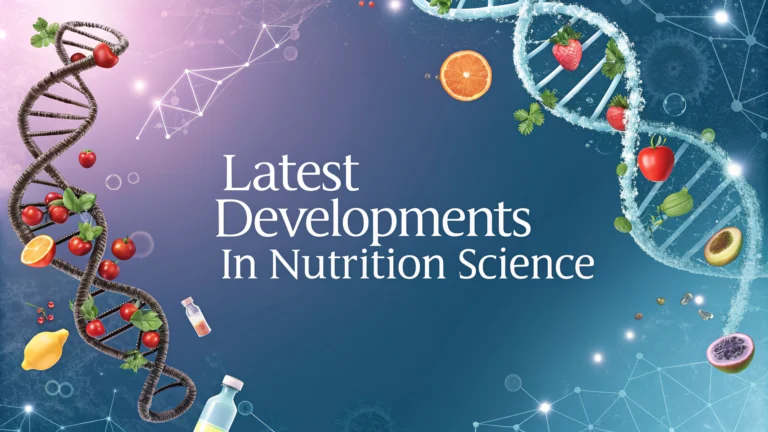Recent scientific research has transformed our understanding of nutrition and its impact on health and fitness.
Key Research Findings
- Personalized nutrition shows better results than one-size-fits-all approaches
- Gut microbiome plays a larger role in health than previously thought
- Time-restricted eating patterns affect metabolic health
- Plant-based proteins can be as effective as animal proteins for muscle building
Microbiome Research
Studies from Harvard Medical School reveal that dietary fiber feeds beneficial gut bacteria, improving immune function and reducing inflammation.
Nutrient Timing
Research from the International Society of Sports Nutrition indicates that post-workout protein intake within 30 minutes optimizes muscle recovery.
Practical Applications
- Eat diverse plant foods for gut health
- Include fermented foods like yogurt and kimchi
- Time meals according to activity levels
- Focus on whole food sources over supplements
Recommended Daily Nutrient Intake
| Nutrient | Amount | Best Sources |
|---|---|---|
| Protein | 0.8-1.6g/kg body weight | Lean meats, legumes, eggs |
| Fiber | 25-35g | Vegetables, whole grains |
Expert Resources
- American Society for Nutrition (nutrition.org)
- Academy of Nutrition and Dietetics (eatright.org)
Contact registered dietitians through the Academy of Nutrition and Dietetics’ referral service at 1-800-877-1600 for personalized nutrition advice.
Quick Tips
- Track food intake using apps like MyFitnessPal or Cronometer
- Prep meals in advance to maintain consistent nutrition
- Read labels carefully, focusing on serving sizes and ingredients
- Stay hydrated with 2-3 liters of water daily
Keep up with new research through peer-reviewed journals like the American Journal of Clinical Nutrition or consult registered dietitians for personalized advice.
Latest Nutritional Research Updates
New studies from leading institutions indicate that nutrigenomics – the study of how genes interact with nutrients – is revolutionizing personalized nutrition approaches. Research shows that individual genetic variations can affect how people respond to different diets.
Supplementation Strategies
- Vitamin D supplementation particularly important for indoor workers
- Omega-3 fatty acids beneficial for brain and heart health
- Magnesium supports recovery and sleep quality
- B12 supplementation essential for plant-based diets
Environmental Impact
Sustainable nutrition choices not only benefit personal health but also environmental wellbeing. Studies show that reducing meat consumption can significantly lower carbon footprint while maintaining optimal nutrition.
Sustainable Food Choices
- Choose locally sourced produce
- Opt for seasonal vegetables and fruits
- Reduce food waste through proper planning
- Consider plant-based alternatives
Conclusion
Nutrition science continues to evolve, emphasizing the importance of personalized approaches and sustainable choices. Success in achieving optimal health requires staying informed about current research while adapting recommendations to individual needs and lifestyle factors.
Key Takeaways
- Personalization is crucial for optimal results
- Consider both health and environmental impact
- Stay updated with credible research
- Consult professionals for individualized advice
FAQs
- What are the most significant recent discoveries in nutrition science?
Recent studies have highlighted the importance of the gut microbiome, chronobiology in nutrition (timing of meals), and personalized nutrition based on genetic factors. The role of polyphenols and their anti-inflammatory properties has also gained significant attention. - How has our understanding of dietary fats changed in recent years?
Research now shows that not all saturated fats are harmful, and that the source matters. Medium-chain triglycerides (MCTs) and omega-3 fatty acids have been found to have beneficial effects on health, while trans fats remain harmful. - What role does the gut microbiome play in overall nutrition?
The gut microbiome has been found to influence nutrient absorption, immune function, mental health, and metabolism. Dietary fiber and fermented foods have been proven to positively impact gut bacterial diversity. - How does intermittent fasting affect nutritional health?
Studies show that intermittent fasting can improve insulin sensitivity, cellular repair processes, and longevity markers. It may also help in weight management and metabolic health when properly implemented. - What are the latest findings on vitamin D’s role in health?
Recent research has expanded vitamin D’s known functions beyond bone health to include immune system regulation, mood stabilization, and potential protection against various chronic diseases. - How do plant-based diets compare to traditional diets in terms of nutritional adequacy?
Well-planned plant-based diets can provide all necessary nutrients except B12, while offering additional benefits like higher fiber intake and reduced environmental impact. Key considerations include protein combining and mineral absorption. - What is the current understanding of sugar’s impact on health?
New research confirms that excess added sugars contribute to inflammation, obesity, and metabolic disorders. Natural sugars from whole fruits, however, don’t show the same negative effects due to their fiber content and nutrient package. - How does sleep quality affect nutrition and metabolism?
Poor sleep has been shown to disrupt hormone levels affecting hunger and satiety, alter glucose metabolism, and impact food choices. Quality sleep is now considered a crucial factor in nutritional health. - What are the latest recommendations for protein intake and timing?
Current research suggests that protein requirements may be higher than previously thought, especially for active individuals and older adults. Protein distribution throughout the day appears more important than total daily intake alone. - How do environmental factors impact nutrient content in foods?
Soil quality, farming practices, and climate change have been shown to affect the nutrient density of foods. Studies indicate declining mineral content in fruits and vegetables over the past decades due to these factors.







